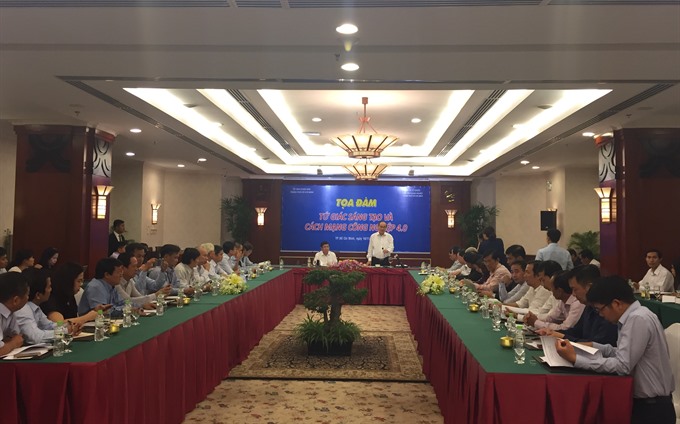 Society
Society

Production of innovative and competitive products would be enhanced if enterprises took advantage of research conducted by local universities and academic institutes, the head of the HCM City Party Committee Secretary said at a dialogue last Friday (Nov 16).
 |
| A dialogue on helping enterprises work more closely with researchers at universities and institutes was held in HCM City last Friday (Nov 16). — VNS Photo Ngọc Diệp |
HCM CITY — Production of innovative and competitive products would be enhanced if enterprises took advantage of research conducted by local universities and academic institutes, the head of the HCM City Party Committee Secretary said at a dialogue last Friday (Nov 16).
Nguyễn Thiện Nhân warned that connections between the State, academia, enterprises and financial investors remained weak.
In the 4.0 industrial revolution, enterprises will have to become more innovative by creating specialty products or better quality products at lower costs, he said.
He noted that Việt Nam’s labour productivity remained low compared to other countries in Asia, due to limited financial capacity and other factors.
“Enterprises that do not increase investment in science and technology will not achieve a high level of productivity,” he said.
Because many investors are afraid of risks, a special financial mechanism should be created to help them bear the expenses if research applications fail, he added.
Organised by the HCM City Union of Business Association (HUBA), the dialogue was attended by city leaders and representatives from departments, agencies, enterprises, universities and educational establishments.
Dr Nguyễn Kỳ Phùng, deputy director of the city’s Department of Science and Technology, said that cooperation between enterprises and research units must improve.
In the 2011-2018 period, the city and enterprises together invested in 147 tasks and orders for scientific and technological research.
However, cooperation between universities and enterprises faces shortcomings, including administrative procedures, financial difficulties, human resources, and lack of specific policies.
“Training and research in universities and institutions have yet to meet the actual demand and requirements of enterprises,” Phùng said.
Many businesses are reluctant to invest in technology innovation because of a lack of trust in academic research, and they are not fully aware of benefits for both sides, he said.
To adapt to Industry 4.0, enterprises should work more closely with universities and institutes and buy technology from abroad, said Kiều Huỳnh Sơn, director of Việt Steel Company.
Improved cooperation between universities, research institutes and enterprises will increase economic efficiency by around five per cent, he said, adding that purchase of foreign technology would add to that efficiency.
“It’s necessary to enhance mutual trust and understanding between universities, institutions and enterprises, especially in technology transfer,” he said.
Dr Đỗ Văn Dũng, rector of the HCM City University of Technology and Education, said that lecturers at universities had little time to engage in research because of the number of teaching hours required.
He said that more innovative teaching methods at the university level were needed, as well as research teams with students who could work on projects with enterprises.
Ideally, faculty members should interact directly with enterprises to access their advanced technologies and learn about their needs. In addition, if faculty visited enterprises more often, both teaching and research would be more effective, he said.
In Việt Nam, it takes from one to two years from research to launch of new products, while the time is shorter in other countries.
“Enterprises should invest in the development of new products, and not depend on the State budget,” Dũng said.
Local research should focus on making products that can replace costly imports, automated products, and quality products that can compete in global markets, he added.
Nguyễn Thành Phong, chairman of the city’s People’s Committee, said local enterprises must continue to improve product quality to remain competitive. — VNS




